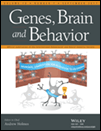 At least one disgruntled co-author has triggered the retraction of a paper presenting a novel approach to treating a rare, genetically inherited condition.
At least one disgruntled co-author has triggered the retraction of a paper presenting a novel approach to treating a rare, genetically inherited condition.
The paper concerned research on Fragile X syndrome (FXS), characterized by both intellectual and physical abnormalities, which is linked autism. A compound that passed through phase 2 clinical trials in October 2015 appeared to partially treat FXS in mice in the study, published earlier this year.
The journal’s notice says the paper was retracted over a dispute among authors about the order in which they are listed on the paper:
All authors cannot agree on a revised author order, and at least one author continues to dispute the original order. In this case, the original article is being retracted on the grounds that the journal does not have permission to publish.
Originally published in February in Genes, Brain, and Behavior, “Nrf2: a novel therapeutic target in fragile X syndrome is modulated by NNZ2566,” was retracted by the journal last month. It has not yet been cited, according to Clarivate Analytic’s Web of Science.
We contacted several authors to try to learn more; Rodolfo Biekofksy, CEO of Neuro-DVI and the eighth author listed on the paper, told us that he contacted the journal to challenge the author order. The paper, he said, was “published without my consent:”
There is a duty that all authors need to be informed that it’s going to be published and they all need to agree on certain things.
He alleges that the team had previously submitted a similar paper to four other journals — with his name listed as first author.
Biekofsky is currently suing the last author of the paper in the UK; he declined to provide details about the nature of the lawsuit. He’s also extended his authorship fight to another 2017 paper, published by many of the same researchers (including the author he’s suing), which he believes unfairly left off his name as a co-author.
An instant response
On Twitter, the retraction notice received a good amount of attention, as users lamented how such a dispute could take down what otherwise appeared to be a valid paper:
I've never seen a retraction like this. https://t.co/02bUl29xV8 pic.twitter.com/rT0f1FoxG7
— Dorsa Amir (@DorsaAmir) October 1, 2017
But as the seven-year history of Retraction Watch reminds us, authorship issues are common and deceptively knotty. Author order can doom a paper just as easily as any other reason.
A spokesperson for the journal told us that it found out about the disagreement in April, via an email:
We gave the authors time to try and resolve their differences and tried to mediate but the authors could not reach a resolution… Hence, in the absence of a resolution, the paper was regretfully retracted.
“I never got notified,” Biekofsky said, adding that he only found out about the paper after he ran across it while he was searching PubMed. He wasn’t surprised to see that he was an author, he said, only that it had been published without his knowledge.
Biekofsky forwarded us correspondence showing that, from December 2015 to March 2017, the authors had submitted a paper to four other journals: the Proceedings of the National Academy of Sciences, Neuropsychopharmacology, Neuron, and NeuroMolecular Medicine.
Using software to compare the earlier drafts to the published paper, Biekofsky said he found them to be similar in many ways — similar figures, results, discussion, and references. (He provided us with those drafts, as well as manuscript tracking documents for each submission.) All four times, Biekofsky was listed as first author and as a joint corresponding author. He said:
That was with the consent of all authors, so everyone was happy to have things like that.
There’s another paper he’s upset about: Biekofsky said his — and his company’s — contributions have been completely omitted from “Brain Transcriptome Sequencing of a Natural Model of Alzheimer’s Disease,” published March 20 in Frontiers in Aging Neuroscience, which has five of the same authors as the other one. He told us:
the article appeared published … without any credit to Neuro-DVI, and I have been omitted from the list of authors.
At present, I am in the process of contacting the journal so that the authorship and credits are either amended, or the article is retracted.
Patricia Cogram, a researcher at the University of Chile and the last author on both papers Biekofsky has flagged, told us she has been advised not to talk about the situation:
there is an ongoing litigation with Dr. Biekofsky and I cannot interfere with it.
Like Retraction Watch? You can make a one-time tax-deductible contribution or a monthly tax-deductible donation to support our work, follow us on Twitter, like us on Facebook, add us to your RSS reader, or subscribe to our daily digest. If you find a retraction that’s not in our database, you can let us know here. For comments or feedback, email us at [email protected].
a rare, genetically inherited condition
I don’t know if 1 in 3600 males is that rare.